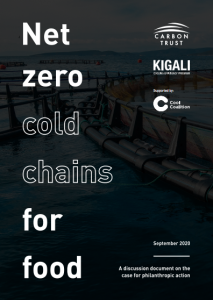A new report by the Carbon Trust, commissioned by the Kigali Cooling Efficiency Programme (K-CEP) outlines the challenge of reducing emissions from rapidly growing food cold chains, identifying how philanthropy can help reach net zero food cold chains while also enhancing food security and poverty reduction.
 ‘Acting now to transition to net zero cold chains can unlock significant climate, food security and development benefits but will require a change from conventional solutions. Philanthropy can play a key role in catalysing this shift at scale and speed to net zero cold chains to ensure we protect the climate, deliver safe nutritious food to consumers and improve farmer livelihoods,’ said David Aitken, Director of Innovation at the Carbon Trust.
‘Acting now to transition to net zero cold chains can unlock significant climate, food security and development benefits but will require a change from conventional solutions. Philanthropy can play a key role in catalysing this shift at scale and speed to net zero cold chains to ensure we protect the climate, deliver safe nutritious food to consumers and improve farmer livelihoods,’ said David Aitken, Director of Innovation at the Carbon Trust.
Cold chains for food are alone responsible for one per cent of total global greenhouse gasses (GHG), according to the report, Net zero cold chains for food – A discussion document on the case for philanthropic action. In developed countries, the emissions are even higher – reaching between two and four per cent of total GHG. Research shows that in developing countries, emissions from cold chains are likely to grow significantly, possibly doubling by 2027 if there is no active intervention.
There’s a strong case for philanthropic intervention in this area, say Carbon Trust, making the case through research presented in their report. The development of climate-friendly cold chains requires a system transition with multi-actor effort. Yet, an integrated approach to net zero cold chains is unlikely to emerge organically, as the effort and benefits are spread across many stakeholders, who lack capacity and incentives to coordinate strategically, according to the report.
‘This presents an enormous opportunity for philanthropy to play a catalytic ‘systems integrator’ role in this complex sector, to reduce GHG emissions whilst delivering on critical areas including food security and poverty reduction,’ said Dan Hamza-Goodacre, Non-Executive Director, K-CEP.
To read or download the report, click here.






Comments (0)